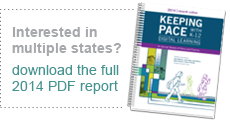Data & Information
Alabama
Essentially all the online education activity in Alabama is through the state virtual school, ACCESS (Alabama Connecting Classrooms, Educators, & Students Statewide) Distance Learning. In 2008, Alabama became one of the first states to establish an online learning requirement. In 2010 Alabama created a limited allowance for each student in grades 9-12 to receive one credit based on mastery of the content without specified instructional time. The seat-time waiver applies to all delivery methods.Fully online schools
Alabama does not have full-time online schools, and it does not have a charter law.
State virtual school
ACCESS is a supplemental program that started in fall 2005 and served 51,809 course enrollments in SY 2013-14, roughly the same number as in SY 2012-13; it is the third largest state virtual school in the country. ACCESS began offering 19 credit recovery courses for the first time in SY 2013-14. Students take ACCESS courses from delivery school sites during set time periods, allowing it to offer courses to receiving school sites that otherwise would not have an Alabama certified teacher to instruct the course. Approximately 5% of courses are offered by interactive videoconferencing. In SY 2013-14, private school students may now take ACCESS courses on a fee basis. ACCESS offers 70 unique courses to grades 8-12, including over 20 original courses developed in partnership with the University of Alabama. Courses are accredited by the NCAA. Five remediation modules for the Alabama High School Graduation Exam are also available to students.
A significant difference between ACCESS and other state virtual schools is the focus on development of the technology infrastructure for receiving online and video courses at school sites throughout the state. This means that a significant portion of the relatively high level of funding (compared to other state virtual schools) is going toward technology infrastructure, including bandwidth, tablet computers, and interactive videoconferencing (VCI) equipment. In addition to its supplemental courses, ACCESS provides other services:
- ACCESS is blending traditional high school instruction, web-based instruction (WBI), and interactive videoconferencing (VCI) courses to provide students with a variety of options. The delivery model is determined at the local school level by the school counselor by examining the learning style and needs of each student.
- ACCESS encourages blended learning by providing districts with its online courses and the LMS to teachers at no cost. All web-based content and LMS tools are available for use in all types of courses.
- In 2010, ACCESS began a partnership with eLearning for Educators to offer online professional development for all Alabama K-12 teachers: classroom, online, and blended. ACCESS offers 120 courses with five Professional Learning Units for administrators; it served 5,212 teachers, counselors, and administrators in its first year and 7,480 in the second year.
- Alabama has implemented a web-based statewide registration, enrollment, and scheduling system to manage the increase in enrollment due to the online learning requirement. It integrates with the existing statewide student information system as well as ACCESS’ LMS.
District programs
While there are no independent district programs in Alabama, a significant difference between ACCESS and other state virtual schools is the focus on development of the technology infrastructure for receiving online and video courses at school sites throughout the state. As a result, a significant portion of the relatively high level of funding (compared to other state virtual schools) is going towards technology infrastructure, including bandwidth, tablet computers, and IVC equipment.
Online learning policy history
State code includes a section on online education that governs ACCESS, the Alabama Administrative Code (AAC) Rule 290-3-1-.02(12) for Online Courses. In 2008, the Alabama State Board of Education established a rule that, “…beginning with the ninth grade class of 2009-10 (graduating class of 2012-13), students shall be required to complete one online/technology enhanced course or experience in either a core course (mathematics, science, social studies, or English) or an elective with waivers being possible for students with a justifiable reason(s).” The Alabama State Department of Education (SDE) has published guidelines on the essential characteristics of a quality online learning experience, specific course standards to meet the graduation requirement, and guidelines for online teachers.
last updated September 25, 2014
back to map


